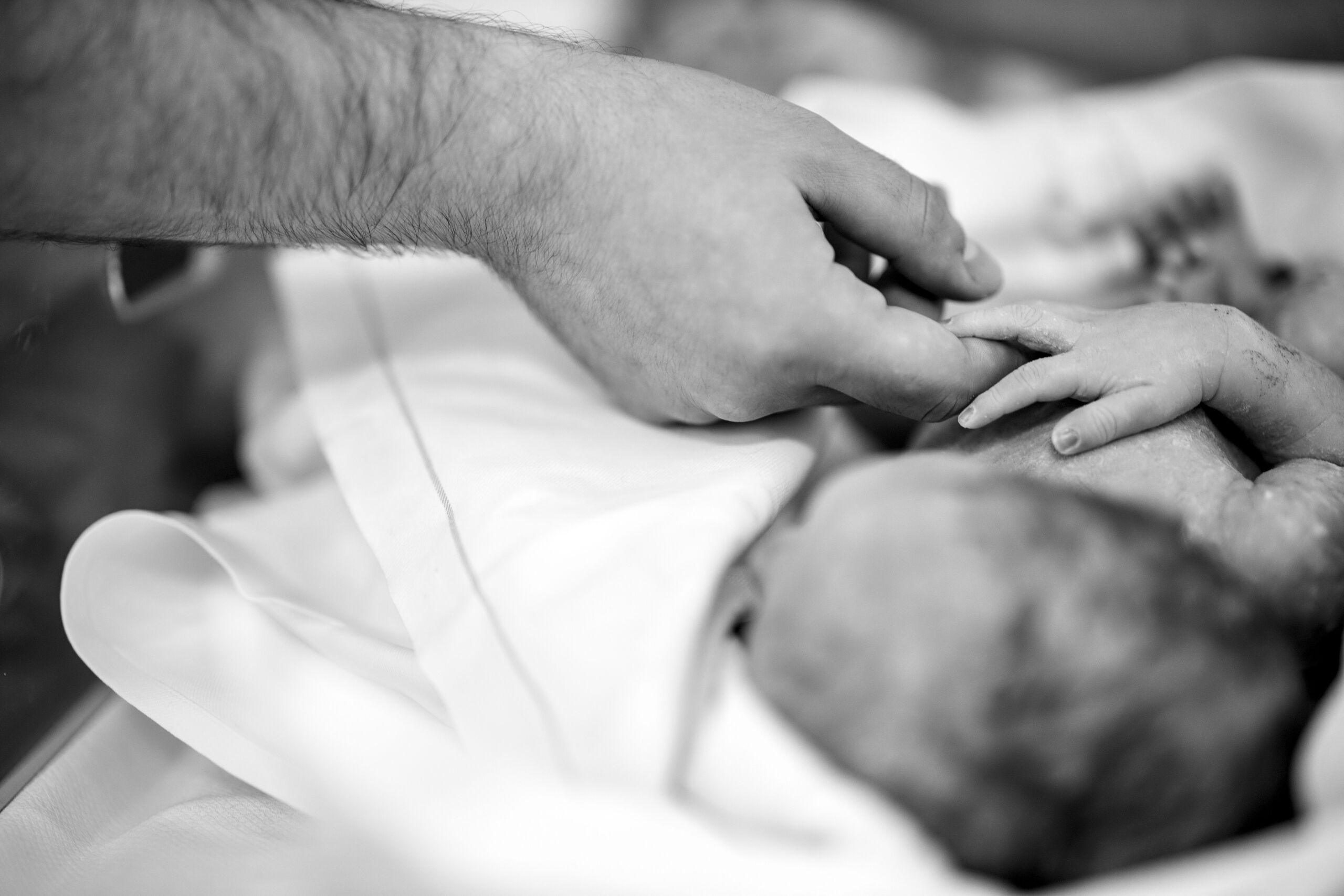A pregnancy usually lasts 40 weeks from the first day of the last menstrual period. Premature babies are children born before 37 0/7 weeks’ gestation, i.e. before 37 completed weeks of pregnancy + 0 days.
Premature babies can be divided into further categories according to the duration of pregnancy and their birth weight:
- A birth before the 28th week of pregnancy (< 28 0/7 SSW) is referred to as an extremely premature birth
- between the completed 28th week of pregnancy and before the completed 32nd week of pregnancy (28 0/7 – 31 6/7 weeks) from early premature birth
- and between 32 weeks’ gestation and before 37 weeks’ gestation (32 0/7 – 36 6/7 weeks’ gestation) of moderately early or late preterm birth .
Birth weight;
- A birth weight of < 2500 g is referred to as a low birth weight,
- < 1500 g of very low birth weight
- and < 1000 g of extremely low birth weight.

Possible complications
In our neonatology department, we offer intensive medical care for extremely premature babies. For these particularly small, light and immature premature babies, the individual risk is assessed on the basis of various factors and the parents are advised in an interprofessional discussion. For more information, see “Shared decision-making in neonatology”.
The immaturity of the organs can lead to various complications and clinical pictures. As a rule of thumb, the younger and lighter a child is, the higher the risk of them occurring. Possible complications of prematurity:
- Bronchopulmonary dysplasia (BPD)
- Persistent patent ductus arteriosus (PDA)
- Necrotizing enterocolitis (NEK)
- Focal intestinal perforation (FIP)
- Intraventricular hemorrhage (IVH)
- Retinopathy of prematurity (ROP)
- Infections
Thanks to advances in the care of premature babies, we now generally only see the clinical pictures described in extremely immature and extremely light premature babies.
Bronchopulmonary dysplasia (BPD)
The lungs of extremely small premature babies are not yet fully mature at birth and are not yet optimally prepared for gas exchange. If an immature lung has to be supported with a ventilator and supplied with oxygen after birth, further lung maturation may temporarily stop and remodeling processes may occur in the lungs, depending on the intensity and duration of ventilation. Depending on the severity of the remodeling processes, lung function may be impaired and cardiovascular stress may persist into adulthood.
Persistent patent ductus arteriosus (PDA)
Before birth, oxygen-rich blood flows from the uterus to the child. As the lungs are not yet responsible for gas exchange at this time, the blood is fed via a short-circuit connection – the ductus arteriosus botalli – past the lungs directly into the aorta and the child’s body.
After birth and the baby is weaned, the lungs take over the gas exchange and the ductus arteriosus is no longer needed. In mature newborns, the duct usually closes spontaneously within a few hours to days.
In premature babies, the duct often remains open for a long time. A large amount of blood can flow back into the lungs through it, which can lead to lung strain and difficult breathing. The ductus arteriosus can often be reduced or even closed with conservative measures or medication. In some small premature babies, however, the closure is not successful. If there are no relevant restrictions in lung and heart function associated with the ductus, no further treatment – which would then be surgical – is usually undertaken, as the ductus often closes spontaneously during the first few years of life. This is checked after discharge from hospital with regular ultrasound checks.
Focal intestinal perforation and necrotizing enterocolitis
The immature intestines of extremely premature babies can be damaged by various external influences, such as local infections and circulatory disorders. In severe cases, the intestine can become so inflamed that parts of the intestine die off (necrotizing enterocolitis, NEK) and a rupture of the intestine occurs.
The therapy initially consists of relieving the intestines by stopping the diet and starting antibiotic therapy. Depending on the stage of the disease, abstinence from food and antibiotic therapy may be the only measures taken; in more severe cases, surgery may be necessary. In the case of isolated perforations (= small hole in the intestinal wall = focal intestinal perforation), surgery is usually performed directly.
Intraventricular hemorrhage (IVH)
The brain of the very immature premature baby is a very sensitive organ. Due to its development, it is particularly susceptible to bleeding before the 30th week of pregnancy, which can occur in the immediate vicinity of the ventricles. Depending on the extent of the hemorrhage, a breakthrough into the ventricular system (= intraventricular hemorrhage) or the surrounding brain tissue is possible. The severity of the bleeding determines the prognosis.
Severe bleeding can lead to a circulatory disorder of the cerebrospinal fluid (CSF), which can lead to the development of a “hydrocephalus”. In such cases, pressure must sometimes be relieved by draining the cerebrospinal fluid to the outside. Bleeding into the brain tissue can lead to relevant functional impairments depending on the location. We care for premature babies under 30 0/7 weeks of pregnancy during the first 3 days of life according to a concept for the prevention of cerebral hemorrhage.
